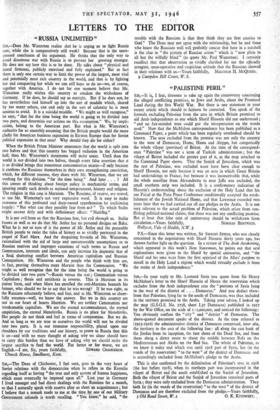"PALESTINE PERIL"
siR,—It is, I fear, tiresome to rake up again the controversy concerning
the alleged conflicting promises, to Jews and Arabs, about the Promised Land during the first World War. But there is one statement in your recent article which should in fairness be corrected. You speak of the formula excluding Palestine from the area in which Britain promised to aid Arab independence as one which Sharif Hussein did not understand ; "and no fair-minded man could put the interpretation on the words used." Now that the McMahon correspondence has been published as a Command Paper, a point which- has been regularly overlooked should be known. The area excluded from the promise was not only the country to the west of Damascus, Horns, Hama and Aleppo, but categorically the whole vilayet (province) of Beirut. At the time of the correspond- ence "Palestine" was not a term of Turkish administration ; but the vilayet of Beirut included the greater part of it, as the map attached to the Command Paper shows. That the Sanjak of Jerusalem, which was the rest of Palestine, was excluded must have been clear enough to Sherif Hussein, not only because it was an area in which Great Britain had undertakings to France, but because it was inconceivable that, while the whole coastline from Alexandretta to near Jaffa was excluded, the small southern strip was included. It is a confirmatory indication of Hussein's understanding about the exclusion of the Holy Land that his son Faisal at the Paris Peace Conference" conditionally accepted the estab- lishment of the Jewish National Home, and that Lawrence recorded two years later that we had carried out all our pledges to the Arabs. It is not very relevant to the actual problem of Palestine, which arises from con- flicting political-national claims, that there was not any conflicting promise. But at least that false coin of controversy should be withdrawn from
circulation.—Yours faithfully, NORMAN BENTWICH. Hollycot, Vale of Health, N.W. 3 P.S.—Since this letter was written, Sir Stewart Syines, who was closely concerned in the negotiations with Sharif Hussein thirty years ago, has thrown further light on the question. In a review of The Arab Awakening, which appeared in this week's New Statesman, he points out that oral explanations were given to the Sharif by special emissaries, and "the Sharif and his sons w:re from the first apprised of the Allies' purpose to install in the Holy Land a regime which would virtually exclude it from the realm of Arab independence."






























 Previous page
Previous page